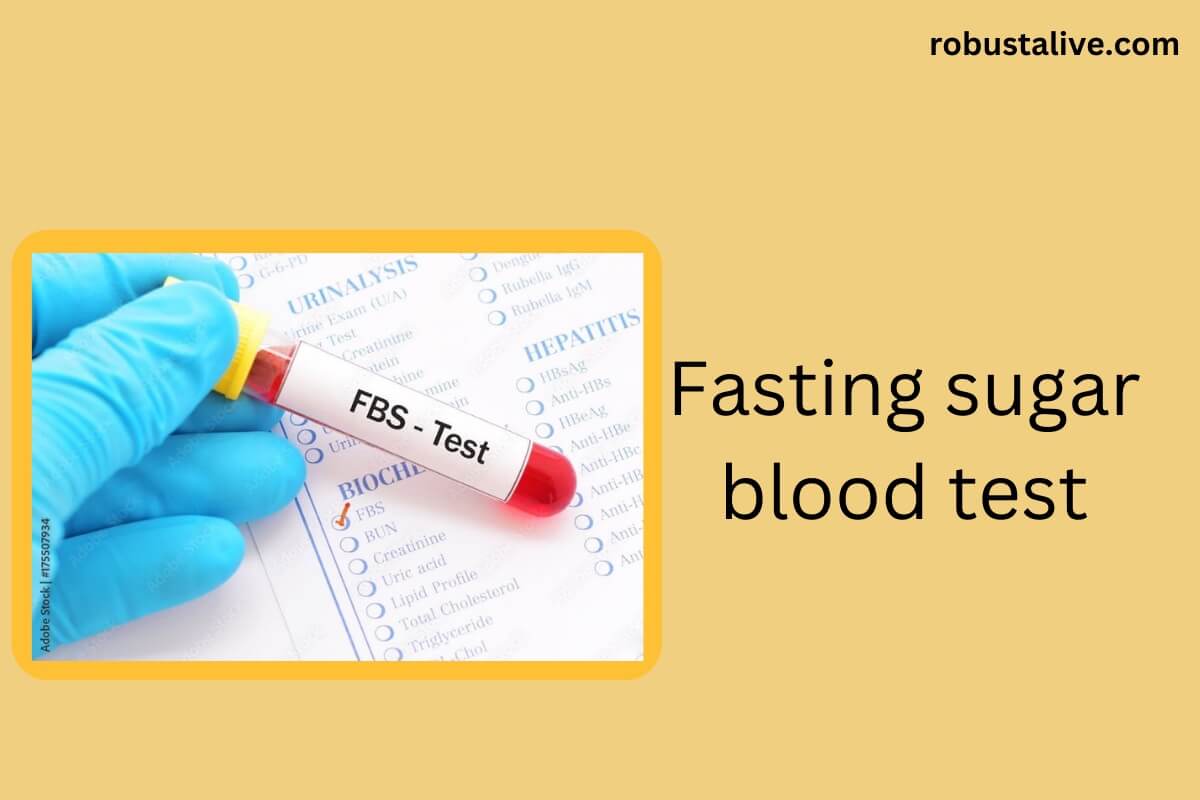Fasting Sugar Blood Test – Testing and Healthy levels

Fasting blood sugar level gives some big hints about the diabetes management of that person. The glucose levels generally increase after 1 hour of a meal and start to decline after that. A high fasting blood sugar test points towards diabetes or insulin resistance, whereas a low level can be because of diabetes medications.
A fasting blood sugar test is for the measurement of glucose levels in the blood. It’s simple, safe, and the best way to diagnose diabetes, pre-diabetes, and gestational diabetes. A health specialist will prick the finger with a needle to extra the blood. For 8 to 12 hours, you can’t eat or drink anything before the test.
Knowing about the fasting sugar blood test especially when you are prediabetic, will help you to stay healthy and avoid the related diabetes risks. Keep reading to learn all the vital information about the fasting sugar blood test.
When does a person need a fasting sugar blood test?
Type 2 diabetes, gestational diabetes, ad pre-diabetes generally don’t have symptoms at the start of the disease. Therefore the occasional fasting sugar blood test will provide your health provider with the following detail:
- For pregnant women to ensure their hormone change is not causing the gestational diabetes
- When a person has the irregular blood sugar level
- As a part of the annual examination to keep track of blood sugar levels over time
- When a person is obese, has diabetes, or has a family history of diabetes
Fasting blood sugar level
Glucose provides energy to the body that comes from the food we eat. The energy is only utilized in stages. As the insulin in the body stores, the body releases it when it’s required. When you have a meal, your blood sugar level generally rises within an hour and falls after one hour.
The blood glucose level and its peak timing depend on your food. Some foods related things that can result in a significant increase in blood sugar include:
- Sugary food and drinks
- Having large meals
- Eating simple carb foods like sweet snacks or bread
As the blood sugar level rises, the pancreas releases more insulin. It lowers the blood glucose level and breaks it down so the body can drop it and use it to store energy for later usage. However, diabetic people face difficulties with insulin in one way or another.
Type 1 diabetes patients don’t have enough insulin as their body unconsciously attacks its insulin-producing healthy cells. Whereas, people with type 2 diabetes develop insulin resistance, or maybe their body isn’t making enough insulin to control the blood sugar level.
In all of these cases, the main problem is difficulty controlling blood sugar levels or using glucose. The fasting blood sugar level depends on three main things:
- Your previous meal size
- The contents of your last meal
- The body’s ability to respond to the insulin
Fasting blood sugar levels offers insight into how the body manages sugar. High fasting blood sugar level shows that the body cannot lower the blood glucose. It also points towards inadequate insulin production or insulin resistance. At the same time, the low glucose level indicates the diabetes medications that lower blood sugar medications.
Testing
Health providers generally recommend the HbA1c test, continuous glucose monitoring, or a conventional blood sugar test to access the fasting sugar blood test.
The HbA1c test
This test is used to assess the overall blood sugar level. The HbA1c test measures blood sugar levels over time, especially in the last three months. A person goes through this test in the laboratory or the doctor’s office. If the levels are high, doctors may recommend a second test. The results are in the form of a percentage.
Blood sugar testing at home
You can quickly test your blood glucose at home. Doctors often recommend that patients check their blood sugar levels at home after waking up before having breakfast. It’s good to check the blood sugar after 2 hours of eating or before having the meal as the blood sugar gets to normal after 2 hours of having dinner.
The correct time to check blood sugar depends upon many factors and the treatment goals. For example, most diabetics don’t need to track in between meals as they aren’t using the diabetes medications to lower the levels instantly. People can also check between meals as they drop their blood sugar levels.
As there is insufficient insulin production in type 1 diabetics, they need to test their sugar levels several times a day to adjust the insulin doses according to the body. A person can test his blood sugar levels by the following steps:
- Prepare the glucose monitor and testing strips ready before taking the blood sample
- Clean the fingertip with an alcohol swab before pricking
- To resist the pull away of the impulse, brace against the hard surface or lance the test area.
- To increase the blood flow squeeze the fingertip
- Put the blood drop on the test strip
- Place the strip in the monitor
- Record the time, blood sugar reading, and recent food intake in a log
Continuous glucose monitoring
Continuous glucose monitoring is another option for daily use. For CGM, the person must wear a monitor for 24 hours. This monitor will continuously record your blood sugar level. Continuous glucose monitoring accurately gives the sugar level fluctuations throughout the day. However, this kit is generally more expensive, depending on the insurance level.
Fasting blood sugar test
According to the experts, the average fasting blood sugar level is 99mg/dL. While the fasting blood sugar level that crosses 100-125 mg/dL means the person is prediabetic. On the other hand, a level above or equal to 126 mg/dL shows diabetes.
Maintaining healthy levels
To avoid the hike of rising blood sugar levels, it’s essential to follow a healthy and nutritious diet. Some healthy eating strategies include:
- Eating plenty of fiber-rich foods
- Eating high-protein foods that make you feel full
- Limiting the salt and sugar intake
- Eat the non-starchy vegetables
- Limit the salt and sugar intake
People on diabetes medications have a higher risk of sudden blood sugar dips, so they should follow a healthy diet. They must take steps to prevent the sudden blood glucose level drop. It includes:
- Have regular meals
- If you are doing intense physical activity, then increase your food intake.
- Consult a doctor if you have diarrhea or vomiting, as it can make diabetes management more difficult
- Limit the intake of alcoholic beverages
Symptoms of Imbalance glucose level
You will experience the symptoms once the sugar level gets too low or too high.
Low blood sugar levels
Low blood glucose level generally has the following symptoms:
- Shaking and sweating
- Tiredness and fatigue
- Concentration difficulty
- Jittery feeling
- Weakness
- Lack of coordination
- Irregular heartbeat
- Muscle ache
- Low energy levels
- Headaches
- Weakness
- Paler skin
Lack of coordination
In extreme cases, the low blood glucose level can result in confusion, seizures, loss of consciousness, and inability to eat or drink.
High blood sugar level
Hyperglycemia or high blood sugar level can result in the following symptoms:
- Headache
- Tiredness
- Increased thirst or hunger
- Excessive urination
- Blurred vision
If not treated timely, both low and high blood sugar levels can result in loss of consciousness and seizures. Persistent high blood sugar can increase the risk of serious diabetes complications like cardiovascular disease or eye diseases.
Conclusion
To get a good fasting sugar blood test, it’s vital to maintain and monitor a healthy lifestyle. Prediabetics can prevent diabetes and reverse the condition by managing their blood glucose levels.
Prediabetics and diabetics need to test their blood glucose levels daily to have a record of their results. They need to consult a doctor immediately if they notice any unusual symptoms or changes.
FAQs about Fasting Sugar Blood Test
How many hours of fasting are required for the blood sugar test?
A standard fasting sugar blood test is used to test diabetes. You can’t eat or drink 8 to 10 hours before the test. Anything you eat during this period can fluctuate the levels, so avoid everything except water.
Can I drink water before the fasting sugar blood test?
Yes, you can only drink water in the 8 to 10-hour fasting period before the test. Ask the health care specialist about the number of hours you have to fast.
What’s the normal fasting blood sugar level range?
The expected values for the fasting blood glucose concentration are between 70 to 100 mg/dL. During fasting, blood glucose is between 100 to 125mg/dL. Doctors recommend making a healthy lifestyle and monitoring glycemia levels at these levels.
How do I prepare for a fasting blood test?
Fasting means not eating or drinking anything except water for the recommended hours or overnight before the test. It’s because the ingredients and nutrients that are present in food get absorbed into the bloodstream. It also affects the specific blood test results.
What affects fasting blood sugar?
Fasting blood sugar depends on the following three main factors:
- The content of the last meal
- Size of the previous meal
- Ability to produce and respond to the insulin
How can I reduce the fasting blood sugar level?
Here are a few ways that can help in managing your diabetes:
- Eating a light breakfast
- Changing the timing of your diabetes medications
- If you are taking insulin, try an insulin pump and set it in a way that releases more insulin in the morning.
- Increase the dose of your diabetes medication (after consulting your doctor)
Is fasting blood sugar 8 or 12 hours?
The fasting blood sugar test is a test that requires fasting before blood sugar measurement. Another sugar measurement test is the glucose tolerance test. You can’t eat or drink anything except water for at least 8 hours for these tests.
References
https://www.cdc.gov/diabetes/basics/getting-tested.html#:~:text=Fasting%20Blood%20Sugar%20Test,higher%20indicates%20you%20have%20diabetes.
https://my.clevelandclinic.org/health/diagnostics/21952-fasting-blood-sugar
https://www.medicalnewstoday.com/articles/317466
https://www.mayoclinic.org/diseases-conditions/diabetes/diagnosis-treatment/drc-20371451
https://my.clevelandclinic.org/health/diagnostics/12363-blood-glucose-test
https://www.healthline.com/health/glucose-test-blood





